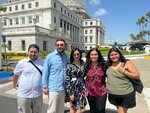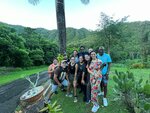


Power is generated: electric power, community power, people power. This past August, a delegation of fifteen Minnesotans visited the island of Puerto Rico to learn from communities on the frontlines of battles for many kinds of power.
Communities are fighting for a reliable power grid, for example, to supply energy across the island. Following an ongoing series of natural disasters such as Hurricane Maria that resulted in months without electric power, as well as the human disaster of failed government relief efforts through FEMA, people across the island are challenging a now privatized electric monopoly. They are fighting back against corruption that has profited greatly from an unstable infrastructure, which results in the loss of human life when insulin can’t be refrigerated, or when a dialysis machine can’t be sustained.
When efforts to pressure the highest levels of government and private economy fail to provoke change, communities in Puerto Rico take their electrical future into their own hands, seeking local solar and other alternative energy solutions. When their purchasing power is insufficient, leaders build access to wealth through the solidarity of the Puerto Rican diaspora. This is the kind of people power that builds movement amidst a system that resists vital public policy change.
We firmly believe that in the struggle to build healthier communities in Minneapolis and across Minnesota, we can learn a lot from the resilient and adaptable organizing of the Puerto Rican people on the island. For this reason, our South Minneapolis-based organization COPAL launched a Minnesota to Puerto Rico delegation this year. Our cohort included elected officials such as Senate Majority Leader Bobby Champion and partners such as the Minnesota Environmental Partnership and the Latino Economic Development Center.
During the visit, our group visited a nonprofit organization in the mountain town of Adjuntas, Puerto Rico, called Casa Pueblo. Casa Pueblo is a people’s organization dedicated to protecting natural, cultural, and human resources, within their town and across Puerto Rico. One of their founders, Alexis Massol González, spoke to our group about their solar resiliency project. Casa Pueblo is doing profound work creating an infrastructure designed to thrive regardless of the condition of the larger island grid, and despite the incompetencies and corruption of government institutions. They have developed a solar-powered theater, barbershop, and market; they have also built a sustainable coffee operation and rainforest school. When they are faced with environmental catastrophes, they have a high level of preparedness that serves their entire municipality by providing critical independent power.
This critical and independent power supply was developed through the critical and independent organizing of the people of Adjuntas. Leaders who started the organization over 40 years ago built a democratic governing institution whose name translates to the “People’s House.” Casa Pueblo is not dependent on government or corporations for its power; in fact, external state actors including the U.S. Department of Energy negotiate directly with Casa Pueblo as an organization with autonomy and the mandate of their members. Those members, who make decisions impacting the future of the municipality, grew in their leadership in battles against extractive mining projects and for the protection of Puerto Rican forests. They are solar-powered, community-powered, and people-powered.
To learn and replicate the transformative work of Casa Pueblo, we must first realize that we are in a place with a lot of wealth. Earlier this year, Minnesota held a budget surplus of over $19 billion. Imagine what a community like theirs could do with our resources! So, what we are lacking is not dollars, but political will, which can be created by organizing together and developing new leadership. So, let’s harness together the core philosophy of Casa Pueblo: creative democratic organizing for a resilient and regenerative future.
Right now, COPAL is working to address environmental injustices at a systemic level by supporting public policy change and grassroots action across the state. COPAL and our partners organize to hold accountability for the systems that should be curtailing the worst impacts of pollution, all while we envision a future with clean heat, electrified transportation, and community-based agricultural systems.
Join COPAL and our partners as we seek to bring about a just environmental future for all. If you are interested in getting connected, send an email to info@copalmn.org. Siempre pa’lante!
Ryan Perez is the organizing director of COPAL at 3702 E. Lake St.
Comments
No comments on this item Please log in to comment by clicking here